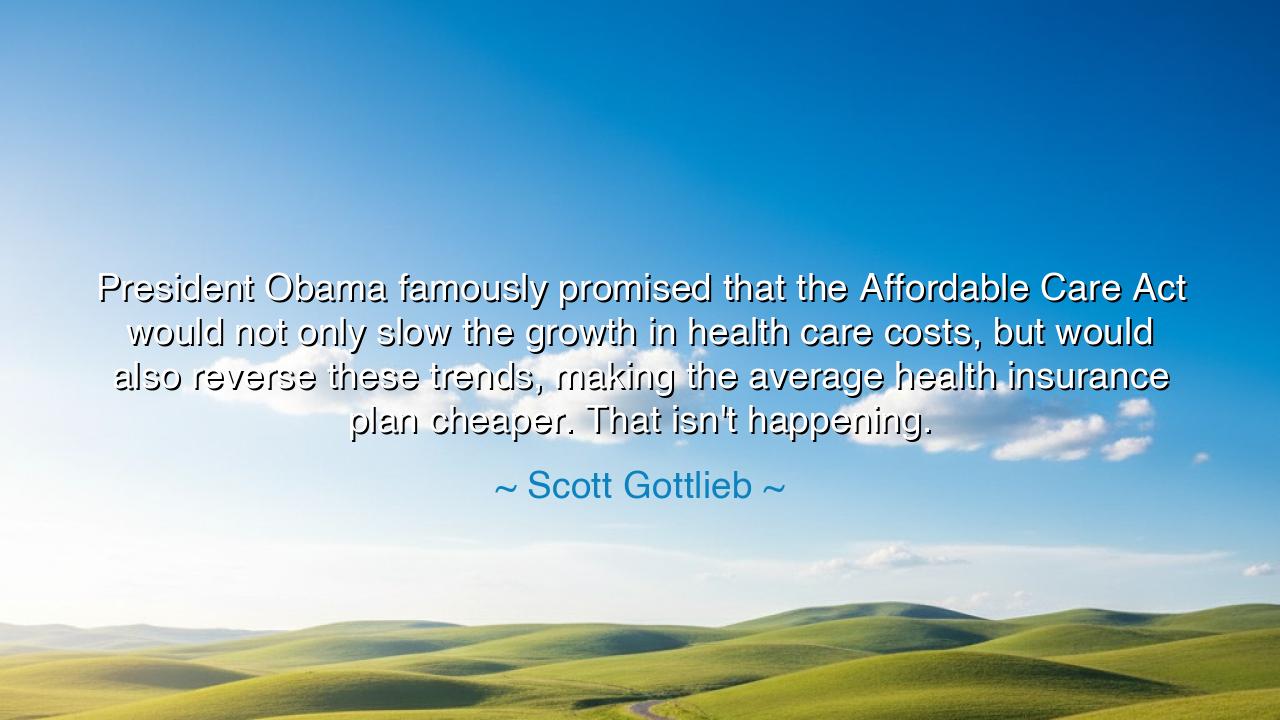
President Obama famously promised that the Affordable Care Act
President Obama famously promised that the Affordable Care Act would not only slow the growth in health care costs, but would also reverse these trends, making the average health insurance plan cheaper. That isn't happening.






“President Obama famously promised that the Affordable Care Act would not only slow the growth in health care costs, but would also reverse these trends, making the average health insurance plan cheaper. That isn't happening.” Thus spoke Scott Gottlieb, physician and scholar, whose words echo both as critique and as warning. Beneath the surface of politics and policy lies the deeper question that has haunted all civilizations: Can human intention alone master the complexity of systems born of need, greed, and hope? In this reflection, Gottlieb stands not as a mere opponent of reform, but as a herald of reality—reminding us that noble promises, though made with courage, must be tested in the crucible of truth.
In these words, Gottlieb laments a failure of expectation—a rift between the promise of reform and the reality of its consequence. When the Affordable Care Act was forged, it was proclaimed as a turning point in the long struggle for equity and access in American medicine. It was to be the dawn of a new era: care for the many, fairness for the poor, and a restraint upon the runaway growth of cost that burdened both families and the nation’s treasury. Yet as time passed, the waters did not still; the tide of expense continued to rise, pressing even harder upon those whom reform sought to protect. Thus, Gottlieb’s voice resounds not only as criticism, but as a reflection upon the eternal challenge of governance—how to bridge the gulf between vision and implementation, between idealism and consequence.
The ancients, too, grappled with this paradox. In the days of Solon, the wise lawgiver of Athens, decrees were crafted to bring justice to the common people and balance to the realm. Yet even Solon himself knew that no law, however just, could alone change the hearts and habits of men. He declared, “Laws are like spider webs; they hold the weak and the small, but the strong break through.” So it is with policy: written with good intent, it must contend with forces unseen—markets, institutions, and human nature itself. Gottlieb’s insight reminds us that while leadership can dream, reality always answers with its own weight.
In this light, the Affordable Care Act becomes not just a policy, but a parable. It represents humanity’s longing for fairness, its attempt to weave compassion into the machinery of commerce. Yet it also reveals how easily the web of reform tangles upon itself when complexity is met with complexity. For the economics of health are no simple matter: they involve millions of choices—of doctors, patients, insurers, and governments—all pulling in different directions. To make health care cheaper, one must first heal the deeper sickness: inefficiency, greed, and the fear that drives consumption. Without addressing the heart of the system, change may look bright at dawn, but dim by dusk.
Consider the tale of Emperor Ashoka of ancient India, who sought to bring peace to his empire through righteousness. He built hospitals, planted medicinal gardens, and proclaimed care for all beings. Yet even he learned that good laws are not enough; they must be tended like gardens, their roots nourished by wisdom and their fruits shared justly. Reform, if it is to endure, must be guided not only by moral vision but by practical understanding—by the harmony of compassion and discipline, of justice and realism. Without both, the seed of good intention may yield bitter fruit.
Gottlieb’s statement thus carries a dual meaning. On the surface, it is a challenge to policy—a questioning of results. But at its core, it is a timeless meditation on human endeavor. It asks: how do we measure success? By the promises of leaders, or by the lived experience of the people? It reminds us that no reform can sustain itself without adaptation, without humility to learn from its failures and courage to correct them. For progress is not born from denial, but from the continual confrontation with truth.
So, my child, take this lesson to heart: hope must always walk hand in hand with honesty. When you set forth to build something—whether a system, a home, or a life—do so with the fire of vision but also the patience of reason. Do not expect perfection from your first attempt, nor despair when the outcome falters. Every promise must be tested, every reform refined. Let not pride prevent you from adjusting course when truth reveals the flaw. For as the ancients taught, it is not the unbroken ship that reaches harbor, but the one whose captain knows how to steer through storms.
Thus, remember Scott Gottlieb’s words not merely as criticism of a law, but as a reflection on the eternal human struggle—to heal a world of endless need with tools of imperfect design. The lesson endures: that the dream of a better world must be pursued with both heart and rigor, with compassion that does not cloud judgment and wisdom that does not extinguish hope. Only then may we approach that distant shore where policy and promise finally meet, and where the healing of nations begins in truth.






AAdministratorAdministrator
Welcome, honored guests. Please leave a comment, we will respond soon